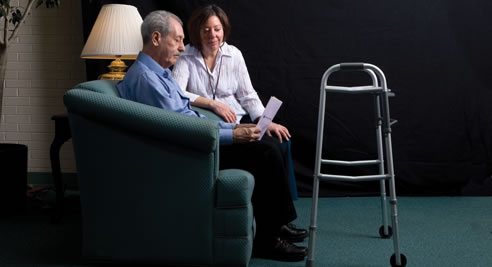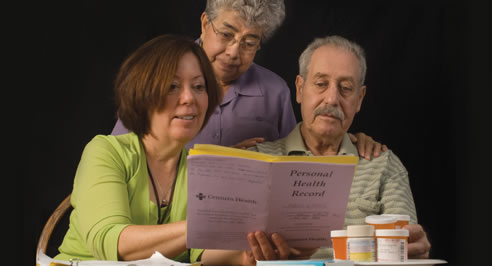Featured Initiative:

Care Transitions Model:
A Transition Coach Makes Recovery from Surgery Faster, Easier
When Frank Yanni, 69, a participant in
the Care Transitions Intervention
program, noticed that the pain he was
experiencing weeks after surgery for a
staph infection of the spinal cord was
not only not getting better but was
getting worse, he knew to insist that it
be looked into. A magnetic resonance imaging test revealed a postoperative infection that required a second surgery. "Had he let that go for even another week, he could have ended up in the ICU, septic and horribly sick," says Kathryn Botinelli, Frank's transition coach.
 After coming home from spinal cord
surgery, Frank Yanni and Transition Coach
Kathryn Bottinelli, RN, review Mr. Yanni's
upcoming appointments.
As a former ICU nurse, Kathryn
Bottinelli, RN, Transitions Coach,
Centura Home Health, Denver,
Colorado, has witnessed the devastating
consequences when older adult
patients fail to recognize early warning
signs of an exacerbation of their illness
and wind up critically ill. Now working
as a Transitions Coach, Ms. Bottinelli
is particularly interested in educating
patients just discharged from the
hospital about
warning signs of
complications that
require early
attention before
a crisis occurs.
After coming home from spinal cord
surgery, Frank Yanni and Transition Coach
Kathryn Bottinelli, RN, review Mr. Yanni's
upcoming appointments.
As a former ICU nurse, Kathryn
Bottinelli, RN, Transitions Coach,
Centura Home Health, Denver,
Colorado, has witnessed the devastating
consequences when older adult
patients fail to recognize early warning
signs of an exacerbation of their illness
and wind up critically ill. Now working
as a Transitions Coach, Ms. Bottinelli
is particularly interested in educating
patients just discharged from the
hospital about
warning signs of
complications that
require early
attention before
a crisis occurs.
Ms. Botinelli began
working with Frank
and his wife Beatrice
in August 2007. She
first met the Yannis
in the hospital when
Frank was preparing
to go home. The
first surgery for the
infection had left Frank in pain, for
which he needed potent medications.
Ms. Botinelli focused much of her work
with the Yannis on pain control issues.
Frank relied heavily on his wife to keep
track of his medication schedule. "Our
little purple book [the Personal Health
Record] has been a great help to us,"
says Beatrice. "I can keep track of all
his medications." Because Frank's
medications were changed frequently,
Ms. Botinelli worked closely with the
couple on medication reconciliation.
 (Below) The Personal Health Record provides
Mr. Yanni and his wife Beatrice with an
easy reference for medications information,
post-hospital care needs, and space to
log questions for the next time they visit
the doctor.
Ms. Botinelli also helped Frank with
goal setting. He set as his goals being
free from pain and being able to walk
unaided. After the second surgery,
Frank began to feel markedly better.
The pain was diminishing and he was
able to start physical therapy, including
water aerobics, to regain mobility. He is
steadily getting better and is optimistic
that he will achieve his goals.
(Below) The Personal Health Record provides
Mr. Yanni and his wife Beatrice with an
easy reference for medications information,
post-hospital care needs, and space to
log questions for the next time they visit
the doctor.
Ms. Botinelli also helped Frank with
goal setting. He set as his goals being
free from pain and being able to walk
unaided. After the second surgery,
Frank began to feel markedly better.
The pain was diminishing and he was
able to start physical therapy, including
water aerobics, to regain mobility. He is
steadily getting better and is optimistic
that he will achieve his goals.
Having the opportunity to work with a
Transitions Coach meant a lot to the
Yannis. "Kathryn has been a great help
to us," says Beatrice. "Working with her
was very rewarding for me," adds Frank.
Ms. Botinelli also derives great
satisfaction from working with the
Yannis and other patients and family
caregivers as their coach. She sees
patients who are able to maintain their
independence largely because they
have access to the tools provided by
the program, such as the Personal
Health Record where they can read
about red flags for their condition,
write down the content of conversations
with their coach and health
care providers, and keep track of
medications. This can be especially
helpful for patients experiencing
memory difficulties.
"With the Personal Health Record,
patients feel more intelligent talking to
the doctor," says Ms. Botinelli. And it
helps the physician, especially for
patients seeing multiple health care
providers at different sites. "The
patient feels more like a member of
the team and the doctor talks to the
patient with more respect, which
motivates the patient to be more active
in his or her own heath care," she adds,
"and the patients heal quicker."
Next: Model 2: Care Management Plus ›
